Introduction
This report will provide you with the background and evidence that forms a marketing plan for The Body Shop. Throughout the report the organisation’s current marketing environment will be assessed through completing a marketing audit. It will also cover their current positioning and targeting strategy and their marketing mix.
The Body Shop founded in 1976 by Anita Roddick who was a British businesswoman, believed in environmental campaigns and human rights. The Body Shop is a British cosmetics skin care and perfume company which produces and offers natural and fair-trade beauty products. It currently has a product range of over 1,000 skincare, haircare, makeup and body products. These all have an amazing smell with endless options and scents. The Body Shop sells their products in over 3,000 stores located in the UK and internationally in 66 countries which are owned and franchised. Also, The Body Shop sells their products online and through the affiliates and The Body Shop at home programme. Anita Roddick died in 2007; Before that, The Body Shop was owned by French cosmetics company L’Oréal between 2006-2017, Brazilian cosmetics company Natura now owns the company.
Get Help With Your Essay
If you need assistance with writing your essay, our professional essay writing service is here to help!
The Marketing Environment
The marketing environment represents a framework which sometimes can be difficult to categorise. Specific marketing environments are constantly changing, and institutions need to be aware of what is going on in the word around them. Jobber and Ellis-Chadwick (2013, p78) state “the marketing environment consists of the actors and forces that affect a company’s capability to operate effectively in providing products and services to its customers.” Firstly, it is important for The Body Shop to reflect on its marketing environment equally internally and externally. Both is often known as their micro and macro environment. This will help them understand trends within their organisations environment and make plans (R. Masterson & D. Pickton 2014). To support their understanding further, analyses can be used which will be shared in this marketing report.
PEST
The macro environment includes all the forces that can affect an organisation but are outside their sphere of control. “There are several models for analysing the external environment at a macro level. Some of these are very similar, being only incremental changes to earlier models” (Blythe and Megicks, 2010, p80). One model that supports this is the PEST analysis which is a useful tool for The Body Shop to understand the environment in which the organisation operates in. The abbreviation PEST refers to Political, Economic, Social and Technological influences. The report shares a PEST analysis below. It relates to The Body Shop organisation which portrays factors that could influence them.
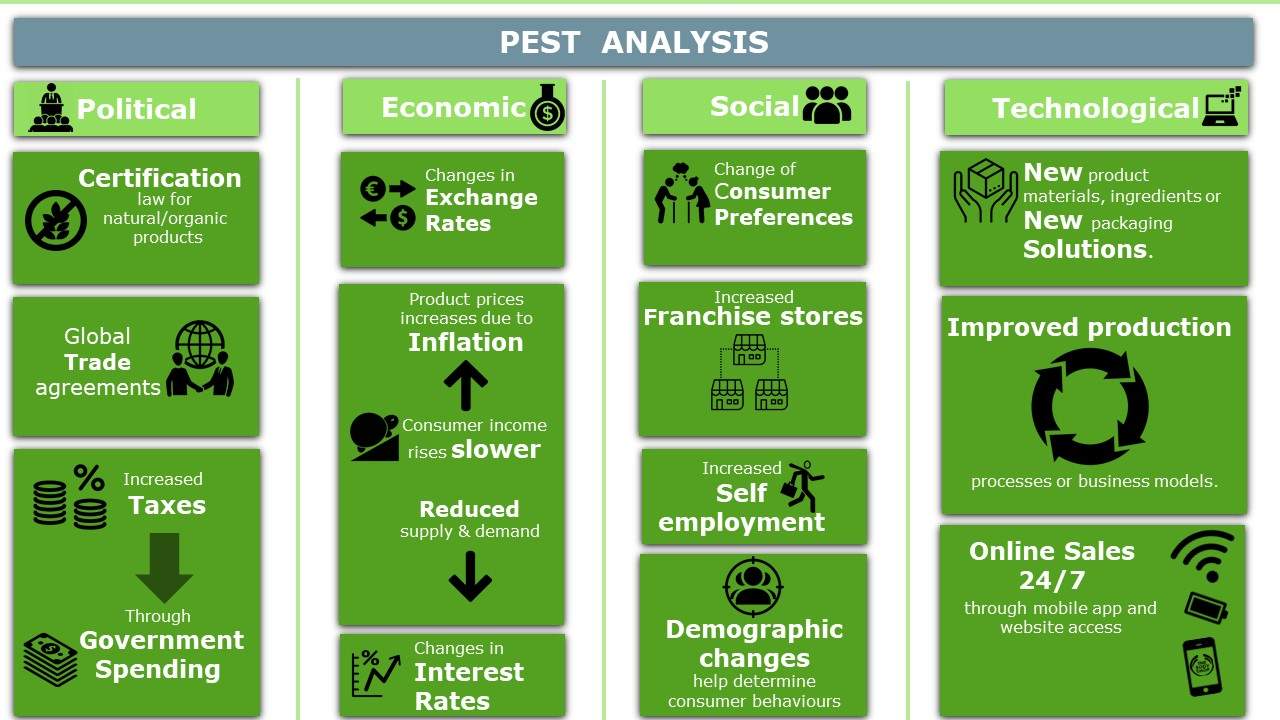
From the analysis above there are several factors in the macro environment that should be looked at by The Body Shop when developing their marketing strategy. Political issues may include potential certification law for natural and organic products and continued government spending, meaning taxes will be increased. Also, the unexpected recession means that retailers may face an unstable economic environment situation. Social factors heavily relate to consumer behaviour, for example, lifestyle choices and attitudes towards these have a real influence on these. This could relate to increasing in Self-employment. According to the Office for National Statistics (ONS) the number of self-employed workers has increased from 3.3 million in 2001 to 4.8 million in 2017. Technology is constantly evolving in today’s market to improve business production and processes, therefore, it is important for The Body Shop to understand the technological factors which will help them remain competitive.
SWOT
A SWOT analysis is a plan which helps organisations to evaluate their overall marketing environment. The SWOT model stands for Strengths, Weaknesses, Opportunities and Threats and it also considers elements from both the micro and macro-environment (Dibb, S., Simkin, L. 2013). Both strength and weaknesses are factors that are specific to the firm. On the other hand, the opportunities and threats focus on the macro environment. These are external factors which feed into the previous PEST analysis, and according to (R. Masterson & D. Pickton 2014) often organisations will have less control over them. A SWOT analysis for The Body Shop has been created below to assist with the current positioning within their environment.
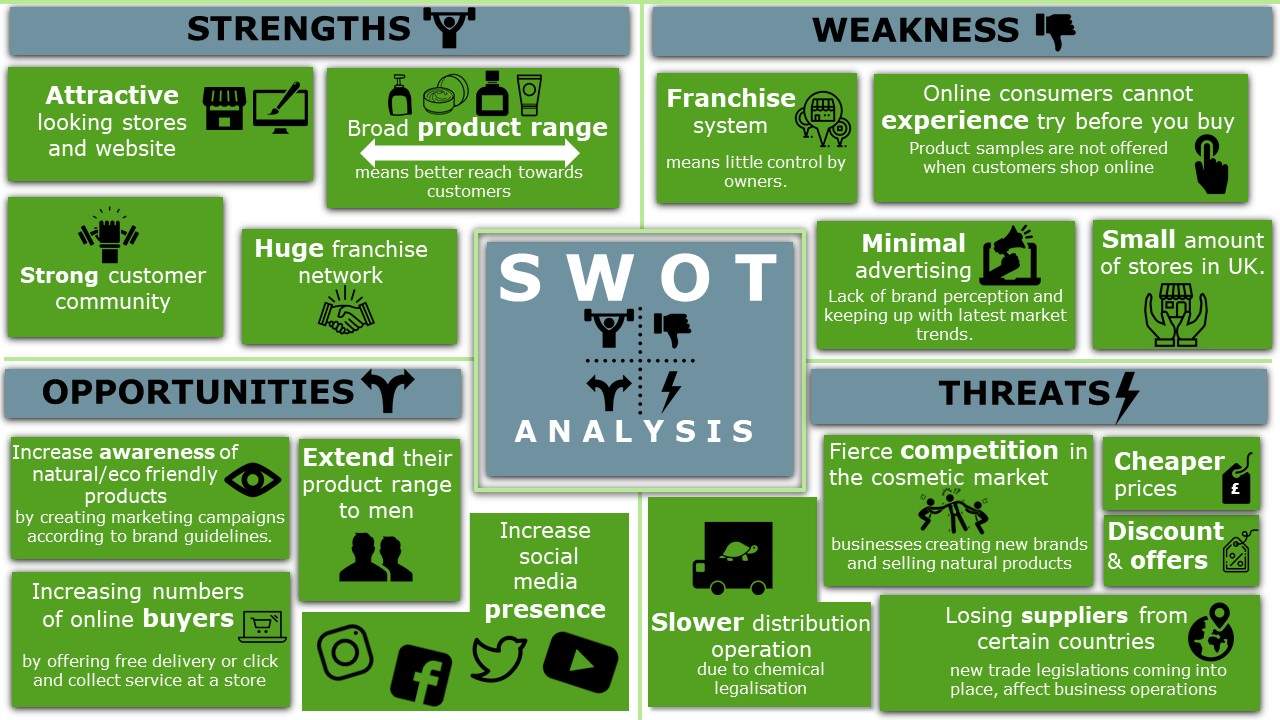
This analysis provides a summary view of the key factors identified in the audit. There are several opportunities The Body Shop can take advantage of, e.g., extending their product range to men. There is also the potential to move weaknesses to strengths, e.g., improve their advertising campaigns to increase brand awareness.
Porter’s Five Forces
Porter’s five forces is a model developed by (Porter 1985). Reviewing the micro level environment brings the organisations analysis closer to the firm. Kotler (1986, p124) noted this “consists of the actors in the company’s immediate environment that affect its ability to serve its customers.” The tool is useful for markets to establish competitor activity as well as competitive threats.

Incorporating the Porter’s five forces model helps broaden the concept of competition and enables marketers to look at the wider picture (Blythe, 2012). From the analysis overall above, it is clear The Body Shop competitive rivalry stands at medium level. Although the power of suppliers and threat of new entrants is at a low competitive force, The Body Shop needs to be aware of the power of buyers and threat of substitutes due to the high number of competitors in the cosmetic industry. This means similar products can be purchased elsewhere.
Positioning and Targeting
Segmentation
Segmentation is “dividing a market into distinct groups of buyers with different needs, characteristics or behaviour, who might require separate products or marketing mixes” (Kotler et al 2005). It is clear The Body Shop’s current marketing strategy focuses on two types of segmentation. The first method is demographic segmentation where The Body Shop offers their products to customers who are both women and men at middle to upper-class level aged between 20-55. Secondly, psychographic segmentation is used by the organisation which attempts to measure and understand peoples lifestyles, values, personalities and/or their psychological characteristics (R.Masterson & D. Pickton p.157)
Targeting
Targeting is “the process of evaluating each market segment’s attractiveness and selecting one or more segments to enter” (Kotler et al 2005). Once the organisation has a segmentation strategy in place, they are then able to decide on a segment to target. An approach The Body Shop could follow would be differentiated marketing which would mean that they target their products towards more than one target segment. However, since they keep their media and advertising to a minimum a concentrated/niche marketing approach for The Body Shop seems more appropriate. The organisation specifically markets their products towards consumers who want natural and healthy beauty products. In addition, The Body Shop uses environmental and social campaigns to promote the brand which influences and targets those who are health and beauty conscious.
Positioning
A product’s position is the place “the product occupies in the consumers mind” (Kotler, 1986, p282). This usually follows naturally from the targeting decision. After the organisation understands its selected target markets ‘it needs to ensure that it fully understands customer/consumer perceptions of competing brands’ (R.Masterson & D. Pickton p.174). An important technique and tool to illustrate the position of an organisation visually towards consumers is a perception map. Perceptual mapping helps to provide insights into appropriate competitive actions (F.Brassington & S.Pettitt). Below the perception maps demonstrate how The Body Shop is currently perceived by its customers and the relation towards its competitors.
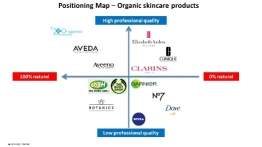
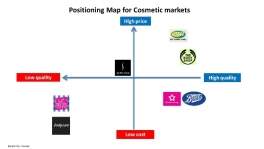
These two maps show how The Body Shop is perceived towards six brands in perception map 1 and twelve brands in map 2. The first map determines the position of The Body Shop with quality and price; the second map looks at natural/non-natural products and their quality.
In perception map 1, their main competitor Lush is the top of range factor offering premium products while The Body Shop is placed just below with average pricing yet still offering high quality products. On the other hand, perception map 2, in comparison with the other twelve brands, The Body Shop positions itself the same as its competitor Lush as they both offer 100% natural products at a similar quality level. The other brands positioned on both maps could be perceived as being below average quality and consumers may go there when they have no other choice.
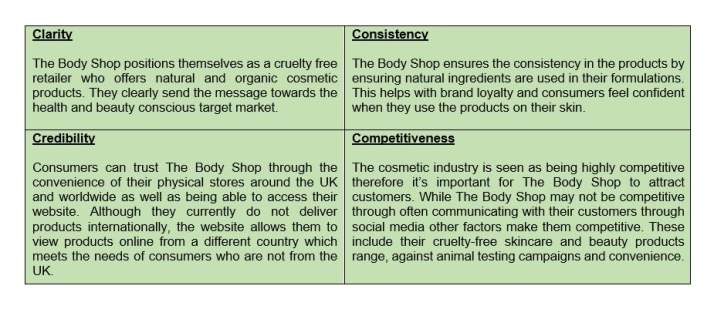 Another method is the use of the 4cs towards The Body Shop positioning strategy. The 4cs stand for Clarity, Credibility, Consistency, and Competitiveness. The 4Cs is a useful tool to create a positioning statement or to build an online value proposition (A. Hanlon 2015). Below I have applied the following analysis to The Body Shop and assessed how the 4cs could be applied to their positioning strategy. The tool is beneficial in a way that it highlights the organisations strengths as well as weaknesses. These have both been identified in the analysis below, and The Body Shop can look at the weaknesses further to improve their organisation.
Another method is the use of the 4cs towards The Body Shop positioning strategy. The 4cs stand for Clarity, Credibility, Consistency, and Competitiveness. The 4Cs is a useful tool to create a positioning statement or to build an online value proposition (A. Hanlon 2015). Below I have applied the following analysis to The Body Shop and assessed how the 4cs could be applied to their positioning strategy. The tool is beneficial in a way that it highlights the organisations strengths as well as weaknesses. These have both been identified in the analysis below, and The Body Shop can look at the weaknesses further to improve their organisation.
Strategies for Growth and Marketing Objectives
After looking at where The Body Shop currently stands within the market, it is then possible to move onto the development of their marketing strategy and make decisions. It is therefore important that marketers set out ‘SMART’ objectives. The SMART framework stands for Specific, Measurable, Achievable, Realistic and Timed. It is useful for marketers as it acts as a guide for goal setting.
The Body Shop should consider using the following SMART objectives:
1) Short Term – Increase the number of orders online and instore by 15% from our marketing communications activities through email and direct mail over 4 months.
2) Long Term – Increase sales of men’s products by 20% by introducing additional haircare and facial care products and target men with online advertisements by carrying out social media campaigns over 18 months.
|
Objective |
Short, medium or long term? |
Specific |
Measurable |
Achievable |
Realistic/relevant |
Timed |
|
Increase the number of orders online and instore by 15% from our marketing communications activities through email and direct mail over 4 months. |
Short term |
Communicate towards customers through marketing communication activities through email and direct mail. |
Measure the number of orders made from online and instore through percentage increase to establish whether the objective has been met. |
Achievable by creating copy and sending out letters in the post and email including sales, discounts and new products. |
The content in the post and email will be professional and eye catching so that customers are persuaded to visit the store or go online and purchase products. |
4 months |
|
Increase sales of men’s products by 15% by introducing additional haircare and facial care products and target men with online advertisements by carrying out social media campaigns over 18 months. |
Long Term |
Advertise new men’s products to the target market of men to increase sales of men’s product range. |
Sales of men’s products are measured through a percentage as well as the revenue of the new products determined by social media. |
Achievable by promoting new products by creating social media campaigns and targeting them at men interested in beauty products. |
Social media is growing and becoming one of the most important aspects of digital marketing. It is therefore beneficial when trying to attract a specific type of customers. Since social media is so popular at present, it is likely men who are interested in beauty products will be targeted easily. |
18 months |
BCG Matrix
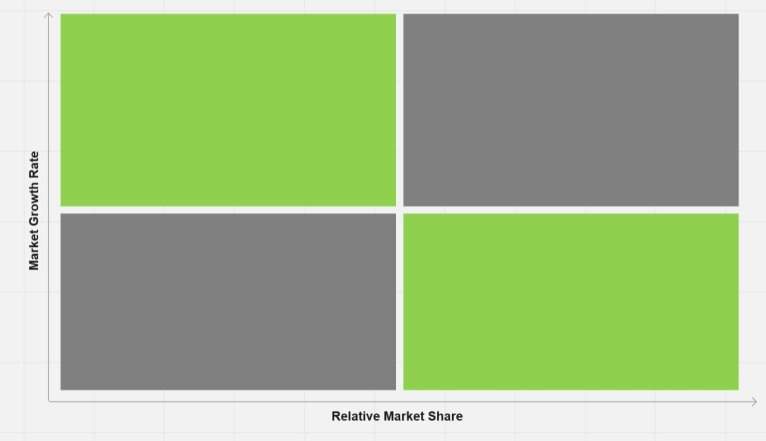 The Boston Consulting Group developed the BCG Matrix in the 1970s which were designed to help with long term strategic planning (A. Hanlon, 2018) and decision making. The matrix is used to identify opportunities for growth by assessing products concerning the market growth rate and relative market share (Brassington and Pettitt, 2007). It can also be useful in developing future strategies for the product range. The model is split into four sections as shown below. Each product is characterised into dogs, question marks, cash cows and stars.
The Boston Consulting Group developed the BCG Matrix in the 1970s which were designed to help with long term strategic planning (A. Hanlon, 2018) and decision making. The matrix is used to identify opportunities for growth by assessing products concerning the market growth rate and relative market share (Brassington and Pettitt, 2007). It can also be useful in developing future strategies for the product range. The model is split into four sections as shown below. Each product is characterised into dogs, question marks, cash cows and stars.
Stars
Stars are products with high market growth and market share. These are often related to on what beauty products are most popular. According to The Body Shop, their body butter, facial masks, shower gels, foot and eye creams be referred to as stars as they are the best sellers which trend highest therefore are market leaders in the growth market. Having said that, if a new trend comes along these will become cash cows. Whilst these products are stars, for The Body Shop to retain its position they should invest which can also support them with innovation/new product development.
Question Marks
Question marks are products with low market share and high market growth. It is uncertain if these types of products are dogs or stars as they are usually new products. At present The Body Shop have a limited product range for men. The next step is for the organisation to focus on introducing new products to the range and following the launch, these will fall into the Question mark category. Following this The Body Shop could reposition these question marks by promoting the products online through social media and perhaps create an instore campaign which could help increase market share.
Cash Cows
Cash cow relate to products with low market growth and high relative market share. These are generally previously a star until the market begins to mature and decline. For The Body Shop the range considered as ‘cash cows’ would include their body butters and facial creams. These products previously would have been classed as stars, however with the development of new products (vegan), different ingredients and scents these prime products are no longer attractive. Due to these being low market growth, The Body Shop would need to focus on a strategy which consists on low provision to maximise profits which will give the organisation more funds for investment in stars or repositioning question marks.
Dogs
Dogs are products with low market growth and low relative market share which can sometimes be a drain on management time and resources. It’s also predictable that organisations are likely to make a loss or very low profit. The Body Shop fragrance products would be part of the ‘dogs’ range seeing as they have a small range and The Body Shop competitors offer the same product with many alternatives. It is suggested that The Body Shop follow the strategy of either bringing in new innovations of the product or simply withdrawing it.
Find Out How UKEssays.com Can Help You!
Our academic experts are ready and waiting to assist with any writing project you may have. From simple essay plans, through to full dissertations, you can guarantee we have a service perfectly matched to your needs.
Ansoff Matrix
The product-market Matrix proposed by Ansoff (1957) provides a useful framework for considering the relationship between strategic direction and marketing strategy (F. Brassington & S. Pettitt). The diagram below will present distinct opportunities, threats, resource requirements, returns and risks (F. Brassington & S. Pettitt) for The Body Shop. This will, therefore, enable to look at potential strategies for growth which can then be implemented into their marketing strategy.
MARKET DEVELOPMENT
The Body Shop could diversify themselves in the future by creating a cruelty free nail polish range and offering them within their nail care product section. This means that this expansion could attract new beauty lovers and reinforce the development of ingredients in products for The Body Shop. This idea could be shared online once again, to increase their brand perception on social media or sending out samples in the post to customers.
The Body Shop could introduce a new range such as cosmetics for babies to focus on market development. This in turn would attract a new target market of parents.
As a result, The Body Shop would be able to use their social media channels to promote the products towards the market or implement an instore campaign by creating posters.
PRODUCT DEVELOPMENT
Increase the sales volume of The Body Shop best-selling products and their current products that are on sale from their marketing communication activities by sending letters in post and emailing customers to increase product/brand awareness and increased market share for products.
The Body Shop should extend their men’s cosmetic range. Developing their men’s product range would attract the main target market allowing them to have a variety to choose from.
This could be achieved by advertising online and creating social media campaigns.
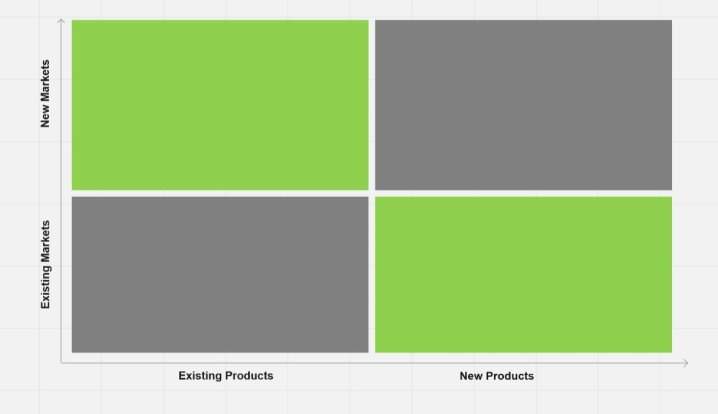 From the Ansoff matrix above, The Body Shop will focus on market penetration and product development. Market penetration will be actioned by marketing communication activities such as emails and direct mail to their target market to engage and to increase brand awareness. Product development will be achieved by a digital marketing plan which incorporates social media campaigns. This will help target men interested in beauty products and promote new products to them.
From the Ansoff matrix above, The Body Shop will focus on market penetration and product development. Market penetration will be actioned by marketing communication activities such as emails and direct mail to their target market to engage and to increase brand awareness. Product development will be achieved by a digital marketing plan which incorporates social media campaigns. This will help target men interested in beauty products and promote new products to them.
Redesigning the Marketing Mix
Kotler el al 1999 defines the marketing mix as “a set of controllable tactical marketing tools that the firm blends to produce the response it wants in the target market.” The model is useful in a way and helps match the customer’s needs precisely. The 4ps is often defined as Product, Price, Place and Promotion. Below is an example of The Body Shop’s marketing mix and where they currently stand, however, to meet the SMART objectives mentioned earlier in this report, it needs to be revised for the organisation to move forward within the market.
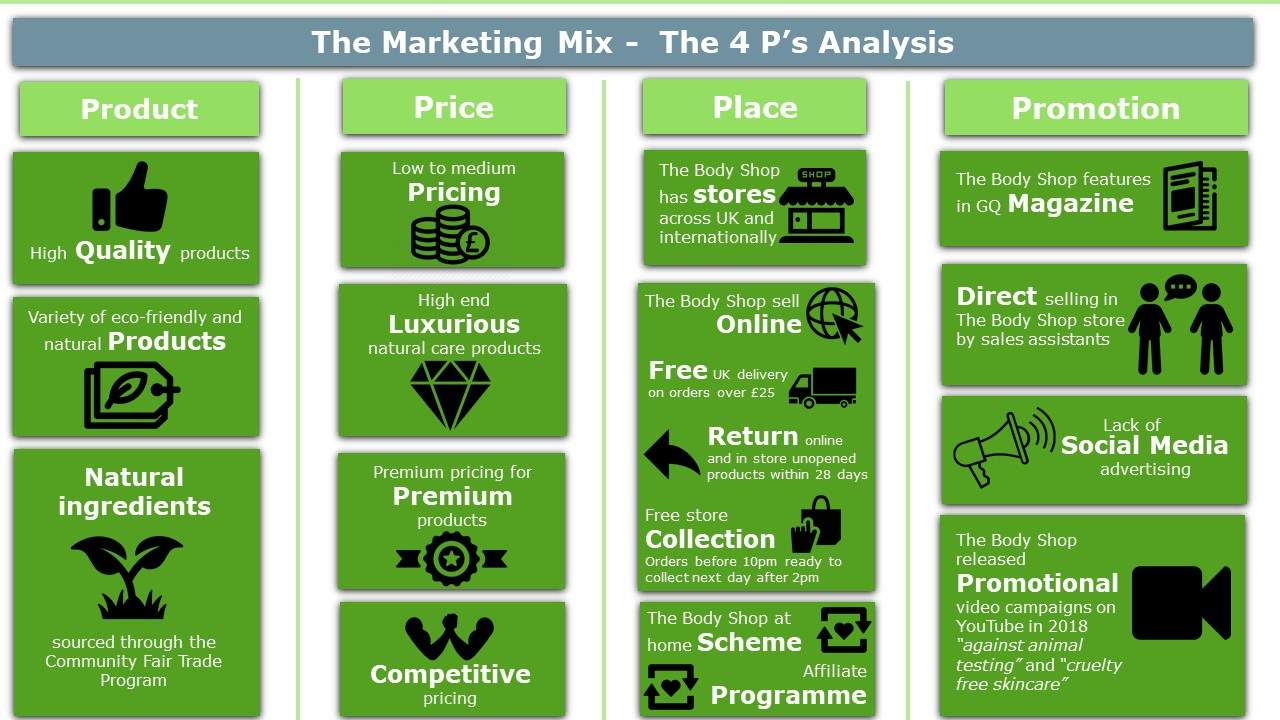
Suggested improvements for The Body Shop:
While, The Body Shop is very good at offering eco-friendly products, the organisation could consider making their products recyclable which would reinforce their brand of looking after the environment and community. This could potentially build their trust with customers and loyalty.
Regarding pricing, The Body Shop mostly fall into the medium to high price category with very few of their products being at a low price, therefore, could result in low demand of the product. With many competitors out there, The Body Shop should consider reducing their pricing on products which are used daily by consumers in the cosmetic market. This would help increase more demand in a product where consumers come back, and sales are increased for the organisation.
The Body Shop has a very comprehensive website where customers can shop from any location around the UK/worldwide and have their products delivered; however the organisation has a small number of stores across the border. To help overcome this The Body Shop should consider delivering promotional campaigns to increase brand awareness by sending out marketing material to promote their current store locations which could potentially increase sales and orders.
Concerning promotion, The Body Shop heavily lack social media advertising. Therefore, the organisation should consider a consistent social media marketing campaign targeting specific audiences to help increase brand awareness and generate revenue online and instore.
In 1990 Lauterborn suggested an alternative marketing mix because the 4ps had become outdated and ‘needed to address the real issues.’ The 4cs define: consumer wants and needs, cost to satisfy, convenience and communication.
Objective 1: Increase the number of orders online and instore by 15% from our marketing communications activities through email and direct mail over 4 months.
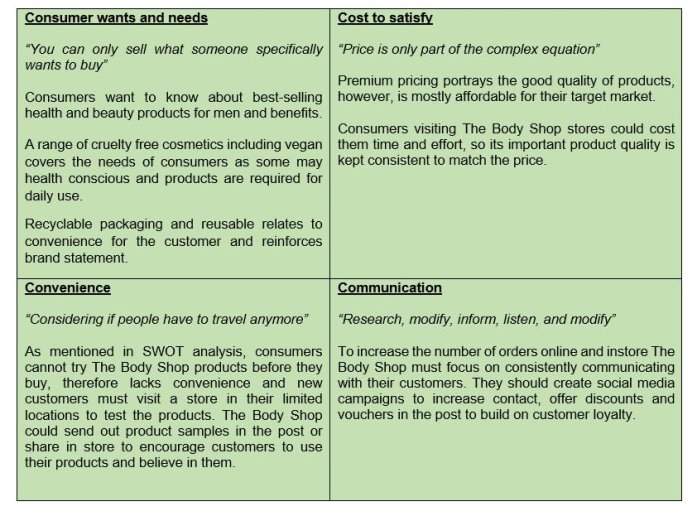 Objective 2: Increase sales of men’s products by 20% by introducing additional haircare and facial care products and target men with online advertisements by carrying out social media campaigns over 18 months.
Objective 2: Increase sales of men’s products by 20% by introducing additional haircare and facial care products and target men with online advertisements by carrying out social media campaigns over 18 months.
Budget, Measurement, and Control
The Body Shop’s marketing budget: £500,000
Short term objective (4 months)
Objective 1: Increase the number of orders online and instore by 15% from our marketing communications activities through email and direct mail over 4 months.
Method: Delivering marketing communication activities, such as writing compelling copy for consumers which will be concise and easy to read in the advert. This activity will be produced in marketing materials such as direct mail and email campaigns.
Measure of effectiveness: Measure the number of orders online and in store. To be determined by click throughs from emails to website and purchases being made, and responses from direct mail instore.
Estimated cost: £20,000
Medium term objective (18 months)
Objective 2: Increase sales of men’s products by 20% by introducing additional haircare and facial care products and target men with online advertisements by carrying out social media campaigns over 18 months.
Method: Introduce new products for men and promote proactively through social media. This will be actioned by creating and managing social media campaigns on Facebook, Twitter, and Instagram. The campaigns will be professional and kept consistent with posts daily.
Measure of effectiveness: Measure the sales income increase in men’s products. Learn and track analytics to analyse the success of the campaigns. Measuring the number of likes, shares, and clicks to the website on Facebook. Measure the number of followers, retweets, likes, comments, replies, and website clicks on Twitter. Lastly measure the number of hashtags, followers, likes, comments and reposts on Instagram.
Estimated cost: £300,000 (includes the development of new products and social media campaigns over 18 months)
|
Total Cost |
£320,000 |
|
Remaining Budget |
£180,000 |
References
- Blythe, J., (2012). Essentials of Marketing. 5th ed. Harlow: Pearson.
- Blythe, J. and Megicks, P. (2010) Marketing Planning: Strategy, environment and context. Harlow, FT/Prentice Hall.
- Dibb, S., Simkin L. (2013) Marketing essentials. 2nd ed. Australia: Cengage Learning.
- Fdagov. (2018) Cosmetics guidance regulation. [FDA]. [20 December 2018]. Available from: https://www.fda.gov/cosmetics/guidanceregulation/lawsregulations/ucm074162.htm
- Hanlon, A. (2015) ‘The 4Cs Marketing Model’. [Smart Insights]. [20 December 2018]. Available from: https://www.smartinsights.com/marketing-planning/marketing-models/4cs-marketing-model/
- Hanlon, A. (2018) The Growth Share Matrix. [Smart Insights]. [18 December 2018]. Available from: https://www.smartinsights.com/wp-content/uploads/2013/10/The-Growth-Share-matrix.png
- Jobber, D. and Ellis-Chadwick, F. (2013) Principles and Practice of Marketing. 7th edition, Berkshire, McGraw-Hill.
- Kotler, P. (1986) Principles of Marketing. 3rd edition, New Jersey, Prentice-Hall
- Kotler, Philip. (1999) Kotler on Marketing: How to Create, Win, and Dominate Markets. New York, NY: Free Press.
- Kotler Philip, A. (2005) Marketing: an introduction. 7th ed. Upper Saddle River: Pearson Prentice Hall.
- Pickton, David, M Rosalind. (2014) Marketing: an introduction. 3rd ed. Maidenhead: McGraw-Hill Education.
- Pettitt Stephen, B Frances. (2007) Essentials of marketing. 2nd ed. Harlow: Financial Times Prentice Hall.
- Pettitt Stephen, B Frances. (2013) Essentials of marketing. 3rd ed. Harlow: Pearson.
- Sarah Coates. (2015) Overview of the UK population. [ONLINE] Available at: https://www.ons.gov.uk/peoplepopulationandcommunity/populationandmigration/populationestimates/articles/overviewoftheukpopulation/november2018. [Accessed 20 December 2018].
- Thebodyshopcom. (2018) The Body Shop Community trade programme. [Online]. [17 December 2018]. Available from: https://www.thebodyshop.com/en-gb/about-us/our-commitment/growing-community-trade/progress-map
- Thebodyshopcom. (2018) The Body Shop About Us. [Online]. [17 December 2018]. Available from: https://www.thebodyshop.com/en-gb/about-us
Cite This Work
To export a reference to this article please select a referencing style below:


